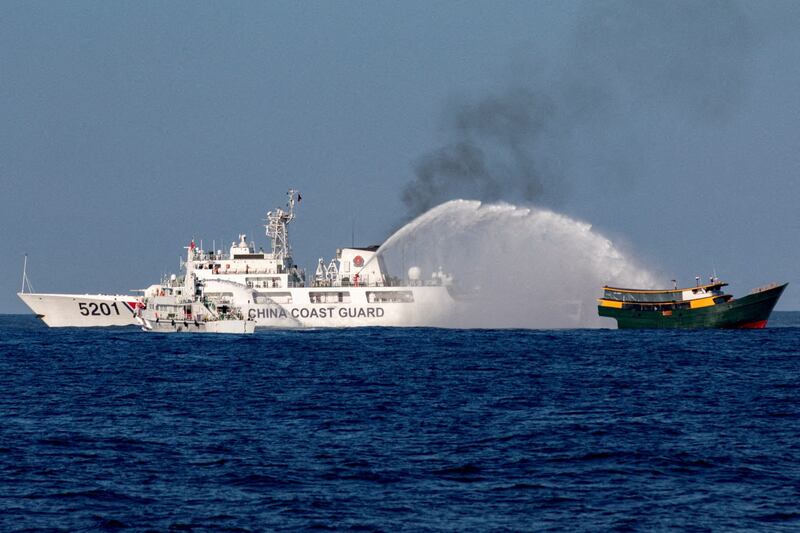Philippine President Ferdinand Marcos Jr. used a speech at the Shangri-La Dialogue security forum in Singapore on Friday to criticize Beijing’s “assertive” moves in the South China Sea and to call for responsible management of the U.S.-China rivalry.
Speaking to an audience of some 600 international security experts and senior government officials, Marcos condemned “assertive actions that aim to propagate excessive, baseless claims through force, intimidation and deception.”
While he did not name a specific country, China and the Philippines have been at loggerheads over reefs that lie within the Philippines’ exclusive economic zone in the South China Sea but are also claimed by China.
Chinese coast guard vessels have been accused of harassing and preventing Filipino fishermen and law enforcement agencies from operating in the disputed waters.

Beijing claims historic rights over 90% of the South China Sea despite protests from other littoral states, including the Philippines. An international tribunal in 2016 also rejected all China’s claims but Beijing has refused to recognize the rulings.
“The life-giving waters of the West Philippine Sea flow in the blood of every Filipino, we cannot allow anyone to detach it from the totality of the maritime domain that renders our nation whole,” Marcos said to a round of applause in the auditorium, using a term preferred by Manila for part of the South China Sea.
When asked by an audience member whether a “red line” would be crossed if the Chinese coast guard killed a Filipino, the president responded in the affirmative.
“If a Filipino citizen is killed by a wilful act, that is, I think, very, very close to what we define as an act of war and therefore we will respond accordingly,” he said. “And our treaty partners, I believe, also hold that same standard.”
However, Marcos, who took office in 2022, added that “differences amongst nations must always be solved peacefully, through legal and diplomatic processes, and never through the threat or use of force.”
Peace and stability
Marcos said that the vision of the 10-member Association Southeast Asian Nations, or ASEAN, for peace, stability and prosperity “remains for now a distant reality,” with illegal, coercive, aggressive, and deceptive actions” continuing “to violate our sovereignty, sovereign rights, and jurisdiction.”
He also called for restraint in the Taiwan Strait, explaining that by virtue of his country’s geographic proximity to the island and the presence of Filipinos in Taiwan, the Philippines has legitimate interests in cross-strait issues.
“The Filipino people have a long history of fraternal bonds with the people on both sides of the Taiwan Strait. Peace and stability must prevail,” Marcos said.
He called on the two world’s major powers – China and the United States – “to manage their rivalry in a responsible manner” as their contest is “exacerbating flashpoints and has created new security dilemmas.”
But China’s influence in the region is “a permanent fact," he allowed, and the United States is a “stabilizing presence” crucial for peace in the Indo-Pacific.
Marcos is the first Filipino head of state to address the Shangri-La Dialogue, which has been held annually by the International Institute for Strategic Studies, IISS, since 2002 and considered one of Asia's most significant security gatherings.
His policies towards the United States and in the South China Sea, meanwhile, have been deemed by many commentators to be a striking U-turn from those of his predecessor Rodrigo Duterte, who was seen as more friendly toward China.
Under Marcos, Manila and Washington recently also signed a deal that gave the United States access to a total of nine Philippine military bases.
"Marcos' stance on the South China Sea has almost certainly got him this prime-time speaking slot, because he's such a game changer in how the strategic situation plays out," said Ray Powell, director of the SeaLight project at Stanford University.
Manila’s ‘latticework’
However, Marcos’ speech was not only about the South China Sea, since the president also likely wanted “to look balanced,” Powell noted.
“He also wants to be seen as having other partners other than the U.S.,” the maritime expert said, pointing to what observers call “a latticework” of expanded ties that Manila has forged with other U.S. allies and partners in the region.
Shahriman Lockman, an expert in Southeast Asian maritime security at the Institute of Strategic and International Studies (Malaysia), said he believed Marcos had a made conscious effort to give ASEAN sufficient prominence in the speech.
"Marcos was primarily casting the Philippines as an ASEAN member rather than an ally of the U.S.," Lockman said, noting that Marcos called ASEAN centrality a "core element" of his foreign policy and spotlighted Manila's other regional alliances.
Marcos’ speech has been depicted by Chinese analysts as not helpful to the situation in the South China Sea.
Ma Bo, an associate professor from the School of International Studies at Nanjing University, told the state-run tabloid Global Times that the tone for this year's forum is to emphasize tensions in the South China Sea and cast blame on Beijing.
Ma was quoted as saying that Marcos’ speech would only add fuel to the fire.
At the Shangri-La Dialogue on Saturday, U.S. Secretary of Defense Lloyd Austin will deliver a speech on Washington’s strategic partnerships in the Indo-Pacific.
Edited by Alex Willemyns and Malcolm Foster.
BenarNews, an RFA-affiliated online news organization, contributed to this report from Manila.
